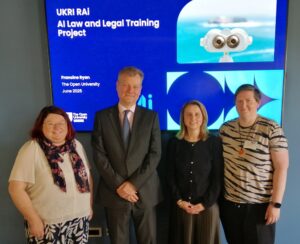OU News
News from The Open University
- Home
- Free online resources to promote a safer use of AI in legal settings
Free online resources to promote a safer use of AI in legal settings
Posted on • Law

A new suite of free resources spearheaded by The Open University is launched today (Wednesday 6th August 2025) to both embrace AI and recognise its challenges for the legal and access to justice sector.
The rapid advance and integration of Generative AI (Gen AI) has brought huge changes and a myriad of ethical challenges for the legal sector.
Lawyers and members of the public – many of whom are representing themselves to save costs – risk paying a high penalty for using misinformation in court obtained from Gen AI tools. There is a lack of free trusted resources to address both the limited knowledge in the profession and to educate the general public searching for legal advice.
To solve this the Open University’s (OU) Open Justice Centre is leading a new initiative to provide free resources: called the AI, Law and Legal Training project, it’s a collaboration with the University of Lincoln and Citizens Advice, the latter supports the public with legal information and guidance in person, by phone and via online support.
Gen AI tools come with risks and are not infallible
The project is funded by UKRI Responsible AI, part of the skills programme that focuses on responsible AI skills. A suite of research-informed free resources – developed with support from lawyers at Fieldfisher, Mishcon de Reya and Browne Jacobson – have been created to enhance the use of GenAI both for understanding legal processes and accessing legal information.
Earlier research, outlined in the research team’s Interim AI Law and Legal Training Report, has shown that knowledge and knowhow of Gen AI and AI tools is lacking.
It revealed an urgent need to equip and educate the public to avoid picking up misleading and even erroneous legal guidance from AI tools which were not designed for legal advice.

The project team with Lord Justice Birss at the launch event
Many people in the UK do not have access to legal advice and assistance: in 2024, the Legal Services Board (2024) reported 32% of the population had an unmet legal need.
The changes to the legal aid system in 2012 led to many legal aid solicitors and law centres closing and many people unable to afford to pay for legal advice.
Using GenAI has been suggested as a way forward to address the access to justice gap, but Gen AI tools come with risks, they are not infallible, and they can produce errors.
Centre Director Dr Francine Ryan said:
“This work will help educate and empower a wide audience including the public, legal advice organisations, small and medium firms, students and academics. It will explain Gen AI, its application, implications and ethical use in legal contexts.
“There is a significant risk of societal harm if we do not build capacity on how to use GenAI ethically and responsibly. Lack of access to legal advice often causes disadvantage, and trusted resources and education on GenAI within law are one way of mitigating existing structural inequalities.”
The free courses as part of AI, Law and Legal Training will provide eight engaging and open access online learning materials which will provide ethical and responsible knowledge of – and skills to use – Gen AI.
The courses will total 20 hours of interactive learning, using video and audio content as well as quizzes to consolidate knowledge spanning:
- an introduction to Gen AI including its advantages and limitations
- key concerns to be aware of, particularly when using Gen AI for legal queries
- an exploration of how Gen AI can be used in a legal context and considerations on how to use it responsibly (with examples of where things can go wrong)
To create the materials the team ran design workshops in the past six months, to explore training needs and inform the course topics. Participants included advisers and volunteers, legal academics and students as well as legal professionals and the judiciary.
The new courses are hosted on the OU’s Open Learn Create platform here and were launched at an event in June in London.
This event incorporated an AI, Law, and Legal Training Workshop. It is part of the AI, Law, and Legal Training project, funded by UKRI RAi, and aims to foster critical discussions on AI’s role in legal education, practice, and access to justice.
Lord Justice Birss delivered the keynote address to open the event, speaking about his experience with AI as a judge and the potential of AI to help close the access to justice gap. His speech was followed by three panel discussions on: AI and Access to Justice, AI and Legal Practice, and AI and Legal Education.
Dan Barrett, Head of Data Science at Citizens Advice, said:
“This project is a great opportunity for the advice and legal sectors to learn more about AI, particularly how to understand the risks for those seeking legal advice.
“We wanted to work with The Open University to develop this course because it means we can really trust the quality of the training. This will ensure our advisers stay up to date and ultimately help protect the people we’re here to support.”
Dr Ryan adds:
“GenAI has the potential to transform free legal advice services, but sustained investment in training and oversight are essential to mitigate risks and ensure equitable access across the sector.
“Furthermore, GenAI presents significant opportunities for the legal sector, but requires careful integration, strong oversight and clear regulatory guidance. To capitalise on the opportunities presented by GenAI, organisations must support their staff in becoming AI literate.”
Main image: From the AI, Law and Legal Training OpenLearn course. Copyright Shutterstock
Insert image l-r: Liz Hardie, Director of the Scholarship Centre for Innovation in Online Learning, Faculty of Business and Law, Lord Justice Birss, Dr Francine Ryan, Director of the Open Justice Centre, Faculty of Business and Law, and Professor Kim Barker, Professor of Law, University of Lincoln.